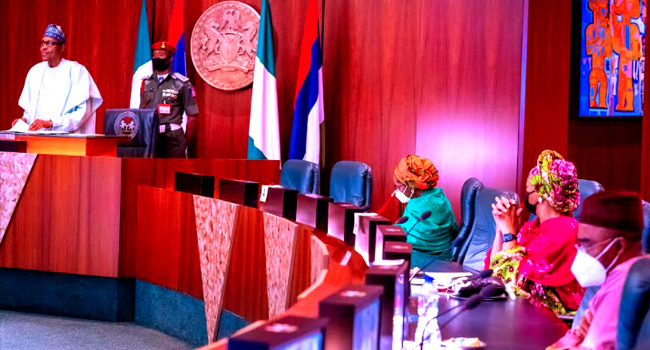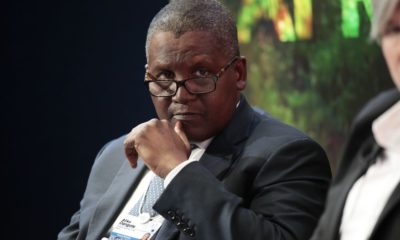On Tuesday, the senate received a request from President Muhammadu Buhari to approve adjustments to the 2022 fiscal framework.
The request was contained in a letter dated 5th April 2022. The letter was read during plenary by the Senate President, Ahmad Lawan.
Buhari, in the letter, explained that an adjustment to the 2022 fiscal framework became imperative in view of new developments in both the global and domestic economies.
According to him, the developments were occasioned by spikes in the market price of crude oil, caused by the ongoing Russian-Ukraine war.
“As you are aware, there have been new developments both in the global economy as well as in the domestic economy which have necessitated the revision of the 2022 Fiscal Framework on which the 2022 Budget was based.
“These developments include spikes in the market price of crude oil, aggravated by the Russian-Ukraine war, significantly lower oil production volume due principally to production shut-ins as a result of massive theft of crude oil between the production platforms and the terminals.
“The decision to suspend the removal of Petroleum Motor Spirit subsidy at a time when high crude oil prices have elevated the subsidy cost has significantly eroded government revenues”, Buhari said.
The President, therefore, requested the upper chamber to approve an increase in the oil benchmark by US$11 per barrel, from US$62 per barrel to US$73 per barrel.
The President also sought a reduction in the projected oil production volume by 283,000 barrels per day, from the current target of 1.883 million barrels per day to 1.600 million barrels per day.
He also request the chamber to approve an increase in the estimated provision for PMS subsidy for 2022 by N442.72 billion from N3.557 trillion to N4 trillion.
Buhari stated the need to cut the provision for Federally-funded upstream projects being implemented by N200 billion, from N352.80 billion to N152.80 billion.
He also proposed an increase in the projection for Federal Government Independent Revenue by N400 billion; and an additional provision of N182.45 billion to cater to the needs of the Nigerian Police Force.
He added that “based on the above adjustments, the Federation Account (Main Pool) revenue for the three tiers of government is projected to decline by N2.418 trillion, while FGN’s share from the Account (net of transfer to the Federal Capital Territory and other statutory deductions) is projected to reduce by N1.173 trillion.”
He disclosed that the amount available to fund the FGN Budget is projected to decline by N772.91 billion due to the increase in the projection for Independent Revenue (Operating Surplus Remittance) by N400 billion.
He explained further that Aggregate Expenditure is projected to increase by N192.52 billion, due to increase in personnel cost by N161.40 billion and other service wide votes by N21.05 billion (both for the Nigeria Police Force), additional domestic debt service provision of N76.13 billion, and net reductions in Statutory Transfers by N66.07 billion.
Giving a breakdown, he said the net deductions would see a cut by N13.46 billion from N102.78 billion to N89.32 billion for NDDC; NEDC, by N6.30 billion from N48.08 billion to N41.78 billion; UBEC, by N23.16 billion from N112.29 billion to N89.13 billion; Basic Health Care Fund, by N11.58 billion from N56.14 billion to N44.56 billion; and NASENI, by N11.58 billion from N56.14 billion to N44.56 billion.
The President noted that the total budget deficit is projected to increase from N965.42 billion to N7.35 trillion, representing 3.99 percent of GDP.
According to him, the incremental deficit will be financed by new borrowings from the domestic market.


 News3 weeks ago
News3 weeks ago
 Business3 weeks ago
Business3 weeks ago
 Technology3 weeks ago
Technology3 weeks ago
 Investment3 weeks ago
Investment3 weeks ago
 Banking Sector3 weeks ago
Banking Sector3 weeks ago
 Banking Sector3 weeks ago
Banking Sector3 weeks ago
 Appointments3 weeks ago
Appointments3 weeks ago
 Investment3 weeks ago
Investment3 weeks ago



























